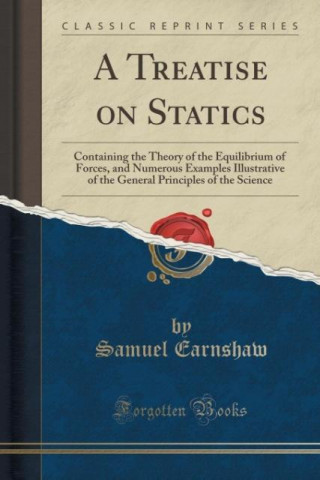
Kód: 13535989
A Treatise on Statics
Autor Samuel Earnshaw
Excerpt from A Treatise on Statics: Containing the Theory of the Equilibrium of Forces, and Numerous Examples Illustrative of the General Principles of the Science If any portion of matter (a stone for instance) be held in the ... celý popis
- Jazyk:
 Angličtina
Angličtina - Väzba: Brožovaná
- Počet strán: 282
Nakladateľ: Forgotten Books, 2016
- Viac informácií o knihe

23.30 €
Dostupnosť:
50 % šanca Máme informáciu, že by titul mohol byť dostupný. Na základe vašej objednávky sa ho pokúsime do 6 týždňov zabezpečiť.
Máme informáciu, že by titul mohol byť dostupný. Na základe vašej objednávky sa ho pokúsime do 6 týždňov zabezpečiť.Prehľadáme celý svet
Mohlo by sa vám tiež páčiť
-

Keeper's Destiny
19.50 € -

Jerusalem Diary
17.65 € -3 % -

Inaugural Addresses of the Presidents of the United States: From George Washington, 1789, to Barack Obama, 2013
46.30 € -

Afterwards
44.86 € -

ARM Assembly Language with Hardware Experiments
127.41 € -

Korea Calling. Politische und wirtschaftliche Auswirkungen des Koreakrieges auf das Westdeutschland der Nachkriegszeit
55.02 € -
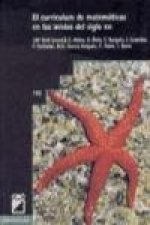
El currículum de matemáticas en los inicios del siglo XXI
21.45 €
Darujte túto knihu ešte dnes
- Objednajte knihu a vyberte Zaslať ako darček.
- Obratom obdržíte darovací poukaz na knihu, ktorý môžete ihneď odovzdať obdarovanému.
- Knihu zašleme na adresu obdarovaného, o nič sa nestaráte.
Informovať o naskladnení knihy
Zadajte do formulára e-mailovú adresu a akonáhle knihu naskladníme, zašleme vám o tom správu. Postrážime všetko za vás.
Viac informácií o knihe A Treatise on Statics
Nákupom získate 57 bodov
 Anotácia knihy
Anotácia knihy
Excerpt from A Treatise on Statics: Containing the Theory of the Equilibrium of Forces, and Numerous Examples Illustrative of the General Principles of the Science If any portion of matter (a stone for instance) be held in the hand, it will be found to exert a pressure; and if the hand he suddenly removed, will fall. In its fall it may be caught, but the hand will again feel a pressure. This experiment informs us, that that which is the cause of motion, is likewise the cause of pressure. While the stone is held at rest, its continual tendency to fall is evi deuced by the pressure which is exerted on the hand; hence, in all cases where motion is prevented, there is pressure. But further, the latter part of the experiment teaches us that, in all cases where motion is retarded, there is pressure. If when the stone is at rest, the hand exert a greater pressure upwards than is necessary to prevent it from falling, the stone will begin to move upwards. Hence we learn that pressure attends the production as well as the prevention and the destruction of motion. Thus it appears that pressure produces the same results as we have taken to be the characteristic effects of force. We may therefore take pressure as the measure of force, because both press ure and motion are effects of the same cause. About the Publisher Forgotten Books publishes hundreds of thousands of rare and classic books. Find more at www.forgottenbooks.com This book is a reproduction of an important historical work. Forgotten Books uses state-of-the-art technology to digitally reconstruct the work, preserving the original format whilst repairing imperfections present in the aged copy. In rare cases, an imperfection in the original, such as a blemish or missing page, may be replicated in our edition. We do, however, repair the vast majority of imperfections successfully; any imperfections that remain are intentionally left to preserve the state of such historical works.
 Parametre knihy
Parametre knihy
Zaradenie knihy Knihy po anglicky Humanities History
23.30 €
- Celý názov: A Treatise on Statics
- Podnázov: Containing the Theory of the Equilibrium of Forces, and Numerous Examples Illustrative of the General Principles of the Science (Classic Reprint)
- Autor: Samuel Earnshaw
- Jazyk:
 Angličtina
Angličtina - Väzba: Brožovaná
- Počet strán: 282
- EAN: 9781332596294
- ISBN: 1332596290
- ID: 13535989
- Nakladateľ: Forgotten Books
- Hmotnosť: 382 g
- Rozmery: 229 × 152 × 15 mm
- Dátum vydania: 14. June 2016
Obľúbené z iného súdka
-

National Geographic The Old West
37.98 € -18 % -

CALULUS FOR THE PRACTICAL MAN
34.70 € -

Battle for Manila
18.78 € -13 % -
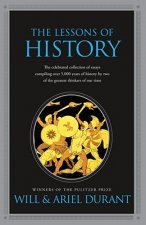
The Lessons of History
11.18 € -23 % -

Falsification of History: Our Distorted Reality
34.49 € -

Gaza
43.11 € -

God's Playground
47.32 € -

God's Playground
47.32 € -

Financial Vipers Of Venice
17.24 € -19 % -

Nalbinding - What in the World Is That?
22.37 € -2 % -

Third Reich in Power, 1933 - 1939
20.94 € -23 % -

Encyclopedia of Japanese Swords (Paperback)
52.56 € -

When Women Ruled the World
23.30 € -21 % -
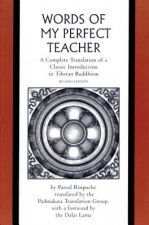
Words of My Perfect Teacher
42.81 € -

Conquering Tide - War in the Pacific Islands, 1942-1944
29.36 € -19 % -

We Have Never Been Modern
36.03 € -12 % -

Shadowplay: Behind the Lines and Under Fire
11.18 € -23 % -

Guns Germs and Steel
26.07 € -17 % -

Secret Projects of the Luftwaffe:
17.86 € -17 % -

American Duchess Guide to 18th Century Beauty
24.43 € -7 % -

Kingdom in the Sun, 1130-1194
14.47 € -23 % -

Normans in the South, 1016-1130
14.47 € -23 % -

Fleet Air Arm Legends: Supermarine
15.70 € -16 % -

On the Origins of War
17.86 € -20 % -

Global Crisis
19.60 € -15 % -

Impeccable Spy
12.31 € -23 % -

State of Africa
14.36 € -18 % -

Modern African Wars (1)
20.22 € -6 % -
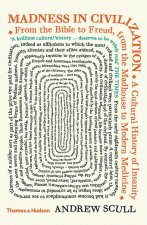
Madness in Civilization
18.78 € -23 % -

Victorian Jewellery
40.44 € -

Talmud Of Jerusalem, Tr. By M. Schwab
23.91 € -

Hitler's Secret Backers
22.07 € -

Blood Royal
21.24 € -19 % -

Life
12.93 € -5 % -

Yellow Star House
20.53 € -

Police Uniforms of Europe 1615 - 2015 Volume Two
56.57 € -

Unknown Warriors
41.57 € -

Uniforms of the U.S. State Police & Highway Patrols
42.40 € -

Germany's Gold
30.18 € -8 % -
![School of Fencing [Tr. from the Fr. Ed. by H.C.W. Angelo] School of Fencing [Tr. from the Fr. Ed. by H.C.W. Angelo]](https://media.libris.to/jacket/18239806t.jpg)
School of Fencing [Tr. from the Fr. Ed. by H.C.W. Angelo]
22.07 € -

Edvard Grieg
41.27 € -
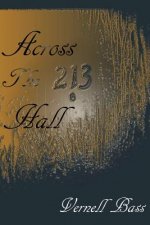
Across The Hall
26.28 € -

Splendid Isolation?
31.61 € -

Enemies of the Later Roman Order - A Study of the Phenomenon of Language Aggression in the Theodosian Code, Post-Theodosian Novels, and the S
12.72 € -

Demetrios of Scepsis and His Troikos Diakosmos
33.26 € -

Abbasid Caliphate
34.80 € -4 % -

Ancient Egypt
42.70 € -
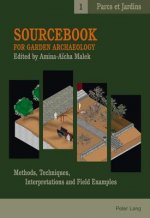
Sourcebook for Garden Archaeology
204.42 € -

High Albania
35.82 €
Osobný odber Bratislava a 2642 dalších
Copyright ©2008-24 najlacnejsie-knihy.sk Všetky práva vyhradenéSúkromieCookies


 21 miliónov titulov
21 miliónov titulov Vrátenie do mesiaca
Vrátenie do mesiaca 02/210 210 99 (8-15.30h)
02/210 210 99 (8-15.30h)